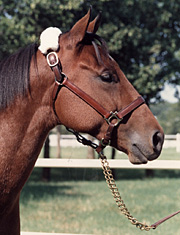 Jim and Marilyn Helzer have created a fund through the American Quarter Horse Foundation to support research for critically injured horses, in memory of their beloved champion Refrigerator, Quarter racing’s all-time leading money earner.
Jim and Marilyn Helzer have created a fund through the American Quarter Horse Foundation to support research for critically injured horses, in memory of their beloved champion Refrigerator, Quarter racing’s all-time leading money earner.
“Refrigerator was a horse that touched the heart of every American Quarter Horse owner, trainer, jockey and fan; he was America’s Quarter Horse,” said Jim Helzer. “A research program for head trauma will once again raise the bar to a new level that will assist veterinarians worldwide in treating all horses that suffer from a severe head injury.”
Since 1960, the American Quarter Horse Foundation has awarded more than $6 million to benefit the health, welfare and utility of the American Quarter Horse. “It is our hope that this comprehensive effort will provide horses with critical injuries a new hope for recovery and a possible return to function,” said Gary Carpenter, executive director of the Foundation. For more information on the equine research program, visit www.aqha.com/foundation. Here’s Refrigerator’s story,
Refrigerator: Rags to riches on the Quarter Horse track
Sonny Vaughn spent lots of time hunched under horses, gripping their legs between his knees, while he clipped and filed their feet and nailed their shoes into place. Many of the Quarter Horse farms near his home in central Oklahoma depended on him to keep their horses shod.
Go Man Go, racing’s famous “Roan Rogue,” was one of his clients. All American Futurity champions Decketta, Possemjet, Laico Bird, and Bugs Alive in 75 all wore his racing plates. By 1988, when Refrigerator, the colt destined to become Quarter Horse racing’s all-time richest money earner, took his first wobbly steps in Vaughn’s own backyard, the hard-working farrier had fitted nearly as many of the rich and famous with shoes as Neiman Marcus.
Vaughn’s father, a hard-scrabble Oklahoma farmer and rancher, instilled his son with a practical outlook. “My daddy’s philosophy about a horse was that if you couldn’t put that booger in a harness and throw a saddle on him and go gather cows, he was really dead weight,” said Vaughn. “But he loved a good horse.”
While Vaughn eked out a living as a farrier, his horses earned their keep as rodeo mounts and broodmares. “I shoe horses to feed my mares and pay the breeding fees,” he explained. “I raise them to sell them, and I just hope they get into the right hands.”
Vaughn relied on the new owners to prove his colts on the track, even those that looked as promising as Refrigerator. Not even Vaughn, however, could have imagined that the stout little bay out of an unraced mare would earn more than $2 million.
“Everybody asks how I raised such a race horse?” said Vaughn. “All I know is that I took Native Parr down to Charlie Bryant and conned him into breeding her on credit. We worked it out in hoof care at $35 a head. Charlie and I were both just trying to survive. It was a good deal for both of us.
“I brought Native Parr home and fed her all the feed that my feed store would sell me on credit, and every night I asked the good Lord to bless my efforts,” he added. “When Refrigerator was born, I was just tickled to death. He was a very impressive colt and everybody that knew him fell in love with him.”
One of the colt’s admirers was then eight-year-old Taylor Winters, an avid football fan who climbed atop the loading chute one day, when Vaughn hauled Native Parr and her suckling colt to the veterinarian. “The colt was three weeks old, fat and slick, and a little ball of muscle,” Vaughn recalled. “Taylor said, `He looks like The Refrigerator,’ speaking of William Perry, the defensive lineman for the Chicago Bears. It just fit him and, after that, everybody started calling him The Fridge.”
The name became official when Vaughn registered the horse.
Refrigerator was treated just like Vaughn’s other colts: he was gelded as a baby and consigned to an auction, when he was a yearling. When he failed to bring the reserve bid, Vaughn sold Refrigerator for $2,700, after the sale, to Delton Dean of Coleman, OK, and Dean’s uncle, Rodney Reed, who had trained Refrigerator’s sire, Rare Jet.
Dean remembered, “I had just started going to the races the year before and Rodney told me, `If you’re going to go to the races, you might as well get a race horse. I can pick you a winner, you know.'”
In January 1990, Refrigerator was the fastest of the fresh two-years-olds that qualified for the Poor Boy Futurity, a restricted race at Oklahoma’s tiny Ross Meadows. He ran second in the finals, impressing Dean and Reed enough that they put him on ice for a shot at the big-money races later in the year.
“I think everybody heard about Refrigerator the first time he started,” said Jim Helzer, the horse’s next owner. “But everybody’s got a barnful of runners in January and February, so I didn’t pay much attention.”
As a native Coloradan and former rodeo rider, Helzer had owned race horses since 1962, but he had never competed with the upper echelon. “I wasn’t financially able to own any good horses,” he said. “I had a few cheap horses, but those never got me anywhere.” By 1990, however, Helzer had established a successful Texas-based roofing and building supply business, and had begun spending up to $100,000 every season at yearling sales, buying a select few horses from the breed’s most successful bloodlines.
Although Refrigerator was not as fashionably bred as Helzer’s recent acquisitions (his sire’s stud fee was $500 compared to upwards of $10,000 for the top stallions), Helzer took notice again that spring, when the gelding confirmed his early promise by setting the fastest time in the trials for the rich Remington Park Futurity. Not long after the qualifying race, Helzer purchased Refrigerator for a reported $150,000.
“He really looked like a big-time runner,” said Helzer, who admitted to being concerned about the colt’s somewhat erratic running style, and the fact that he bled through the nose after the Remington Park trials. But he added, “It’s one of those gambles you take and you hope you get some return.”
Helzer paid a hefty supplementary fee to make Refrigerator eligible for the $2 million All American Futurity in Ruidoso, New Mexico on Labor Day. The bay gelding rewarded his faith by qualifying for the race with the fastest time of all the trial entrants. Trained by Dwayne “Sleepy” Gilbreath and ridden by Kip Diderickson, the nation’s leading jockey at the time, Refrigerator drew away to a daylight win in the All American Futurity. His time was faster than any previous All American winner and his earnings made him an instant millionaire.
Over the next four years, Refrigerator doubled his winnings and earned two world championships, placing him in the elite company of Go Man Go, Dash For Cash, Kaweah Bar, Maddon’s Bright Eyes, Shue Fly and Woven Web. When he won the 1993 Champion of Champions, he surpassed Eastex to become the sport’s richest horse – a distinction he still owns. In 1994, he became the first Quarter Horse to exceed $2 million in earnings.
During his six-year campaign, Refrigerator won 22 of 36 races, including 11 stakes races, and $2,126,309. Even Sonny Vaughn’s daddy would have approved.
Retired in 1996, the celebrated gelding spent his days with Helzer and his wife, Marilyn, at their home in Arlington, TX. In November 1998, he answered the call to post one last time, as he proudly led the post parade for Lone Star Park’s Refrigerator Handicap, won that year by another racing legend, Kool Kue Baby, who set a record for all-time stakes wins that night.
Less than three months later, Refrigerator suffered a traumatic head injury and was euthanized on February 19, 1999, at the age of 11. He was buried during a private ceremony at the Helzer’s JEH Stallion Station near Pilot Point, TX.
“It’s very hard to describe what it was like to own a great horse like him,” said Helzer. “There’s just nothing like it.”
